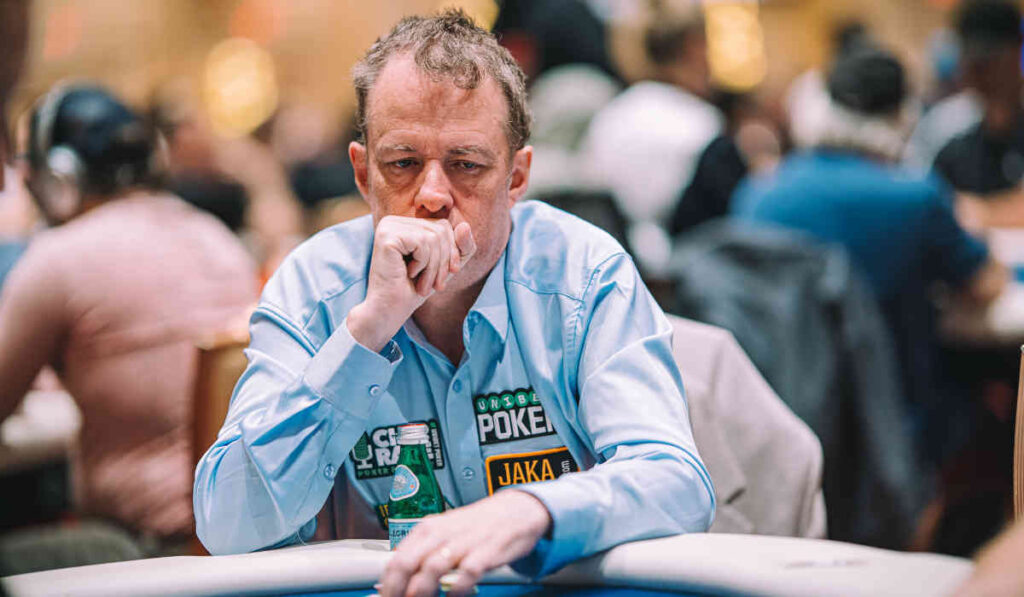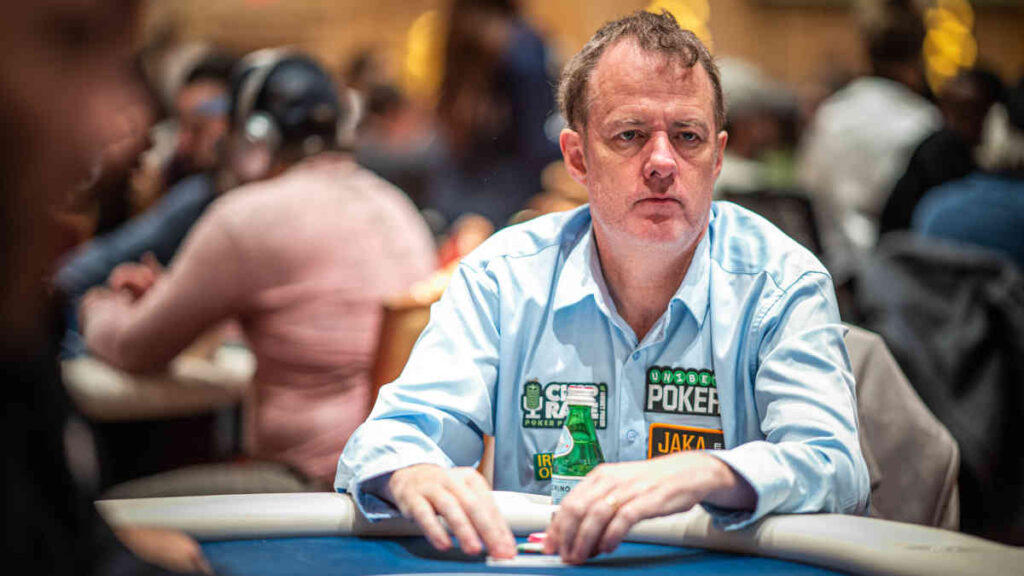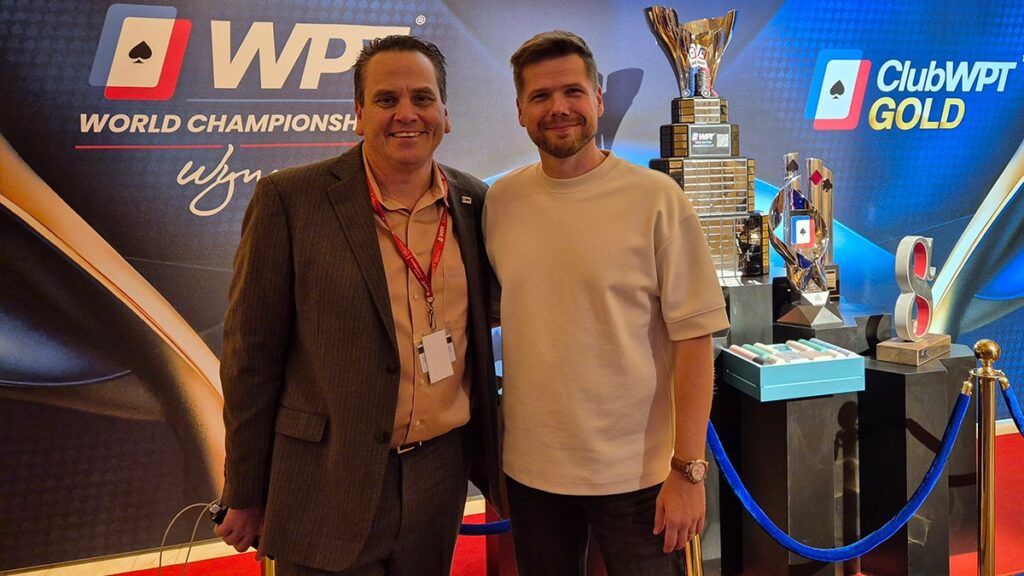Images courtesy of World Poker Tour
Endurance, discipline, and a sharp analytical edge—Dara O’Kearney brings the mindset of an elite athlete to every hand he plays.
In this edition of Inside the Poker Circles, drawn from Between the Blinds: Introducing Poker Professionals by Sara O’Connor (coming this fall), we profile the ultrarunner-turned-poker pro whose marathon mentality has powered a career of consistency and clarity.
Known for his work as a coach, author, and co-host of the Chip Race podcast, O’Kearney has earned respect not only for his results, but for his ability to explain the game in a way that resonates with players at every level.
Whether on the felt or in print, his approach is rooted in logic, discipline, and a relentless drive to improve.
In this interview, Dara shares how his athletic background shaped his poker journey, the strategies that define his play, and what it takes to stay sharp in today’s competitive landscape. This is Inside the Poker Circles.
Do you remember your first time playing? If so, what was it like?
My first time playing was online in May 2007, a little over a month before my 42nd birthday. I was an internationally successful ultramarathon runner, but I knew time was running out on that career due to my age.
I’ve always been hyper-competitive. In my childhood I played almost every game imaginable, and even invented many of my own to play with my brother. In my late teens and early 20s, I focused on chess, also playing it (in its correspondence format, i.e., sending moves through the mail) at an international level.
I won several tournaments. I quit that in my early 20s when I realized I’d plateaued and would never be a grandmaster. I then switched to bridge, at which I was also very successful. Next came backgammon, the first game I won money at playing online. Then came running.
Aware that time was running out literally, I was looking for something to replace it. I saw poker on TV, and it seemed to be something where age was less of a factor, so I thought maybe if I start now, I might be good enough to compete by the time I was 50.
My brother, who was living with us at the time, was already playing semi-professionally. He taught me the basics in one afternoon and that evening I played a few freerolls online.
The following evening, I luck boxed (i.e., got lucky with no real clue what I was doing) my way through a field of over ten thousand in one of those freerolls and came in second place for over a hundred bucks. Poker seemed easy!
Can you tell me about your poker career? How long have you been playing and when did you feel ready to call yourself a professional?
I asked my brother what I should do with the money I won in the freeroll. He suggested low stakes limit cash (though he later admitted the reasoning behind this was he figured I’d lose the money slowest that way).
In fact, I was a winning player from the start, playing a very nitty solid strategy that worked back then. I ran up a six-figure bankroll online fairly quickly from that initial freeroll win, and set up a NETELLER account (i.e., an e-wallet payment service that is commonly used for online poker deposits and withdrawals) so I could move money around onto other sites.

To this day, I have never deposited a cent online and everything I’ve won online came from that initial freeroll seed. Within a few months, I was making more playing online, so I started to wind down my other career as a freelance tech consultant.
By the following year, I was a full-time poker pro. I migrated from limit cash to sit-n-go’s, Heads-Up Super Turbos, and ultimately multi-table tournaments (MTTs), both online and live.
How do you not let past success or losses affect your current play?
I just focus on every decision. I remind myself that my job is to try to make the best decisions, irrespective of outcomes. When it comes to losses, past losses are in the past. You should always look forward in poker.
Do you have any poker related goals you’d like to share?
Not really. My philosophy is to be process-oriented rather than goal-oriented or result-oriented. So, I’ll just keep trying to study, prepare, and execute as well as I can, and whatever happens, happens.
Apart from my own play, I take immense pleasure when my students succeed. I have a “system” to teach poker, so I like to feel that the system works.
In the past year, former students of mine have won a European Poker Tour (EPT) and WSOP bracelets. My goal on that front is to keep improving as a coach.
Have you noticed any common mistakes or misconceptions that new players have about poker?
They focus too much on bluffing and bluff-catching. Bluffing is a much smaller part of the game than most beginners realize. It’s the fun part, but nearly all your profit long-term comes from winning the maximum when you have the best poker hand.
As a player, how do you handle disputes at the table?
I only get involved if I think it will be helpful. Otherwise, I defer to the floor or the dealer. I’ll accept their ultimate decision even if I think it’s wrong. The one exception is if there’s overt sexism being expressed towards female players; then I always speak up.
Do you have any pre- or post-game rituals you practice?
My pre-game ritual is to exercise, eat, study, meditate, and engage in breathing exercises. My post-game ritual is to review some hands, chill, meditate, and/or engage in breathing exercises if I’m upset. I also catch up on social media and play some chess online.
Do you have a favorite hand and, if so, what is it and why?
My favorite hand is 3-3. I have won some crucial pots with it
Do you notice a difference when you play against women?
Yes. They tend to fall into two camps: much easier to bluff, or almost impossible to bluff. That’s not true for all women, but it does comprise two large sub-groups. It’s also not surprising.
I know from the many female players that I have coached that male players often play differently against them and fall into three camps:
- Those who try to bluff them more and are terrified of being bluffed by a woman;
- Those who bluff less or not at all against female players, and believe in turn female players bluff rarely if at all; and
- Those who don’t play differently against them based on gender.
How, if at all, does being an author of poker books affect your play?
It affects the way people perceive me for certain. Some people play more straightforwardly against me, fearing the wrath of my judgment, even if in reality, I almost never judge people on how they play.
We all make mistakes and have holes in our strategic knowledge. Similarly, if I do a play people find unexpected, I often get the line, “What chapter of the book is that in?” But I never let it affect my play. If I think it’s correct to play a hand differently from that advocated in my book in a specific spot, I will. I don’t mind looking stupid at the table.


